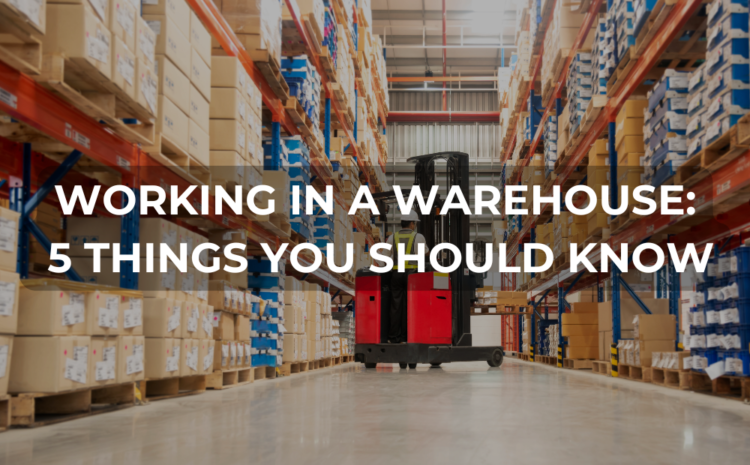Warehouses play a vital role in the operation of many successful businesses, particularly those in the retail sector. Warehouses hold the inventory of a business and ensure that items are safe, organized, and ready to ship. For a warehouse to run effectively, it requires staff to ensure it’s operating in the right way. Warehouse workers should possess specific skills. “Working in a Warehouse” involves organizing and preparing items for shipping, receiving incoming supplies, and arranging storage facilities.
Working in a warehouse can be a physically demanding and rewarding job, but it’s important to understand some key aspects to ensure you thrive in the environment.
Here are five things you should know while Working in a Warehouse:
-
Physical Demands
Warehouses typically involve manual labor, including lifting, loading, and moving items. Some tasks might require you to be on your feet for long hours or work in challenging conditions like cold storage. Having good physical stamina and practicing safe lifting techniques are essential to prevent injuries.
Working in a warehouse can be physically intense. Here’s what you need to be aware of:
- Lifting and Moving: Most jobs involve regularly lifting heavy objects, ranging from boxes to large pallets. Lifting techniques (bending your knees, and keeping your back straight) are crucial to prevent strain or injury.
- Endurance: You may need to stand or walk for long periods. Jobs can also involve repetitive movements, such as bending, squatting, and reaching.
- Temperature Conditions: Some warehouses, particularly those dealing with food or pharmaceuticals, may have temperature-controlled areas like freezers or refrigerated rooms. You may need to wear additional clothing or gear in these environments.
- Shift Work: Many warehouses operate around the clock, so you might be required to work overnight, early mornings, or on weekends. It’s important to maintain good sleep habits to handle different shifts.
-
Safety is a Priority
Warehouses are bustling environments, often with heavy machinery like forklifts or pallet jacks in use. Employers place a strong emphasis on safety. Safety while working in a warehouse is critical due to the nature of the work and equipment involved. Some key safety considerations include:
- Proper Lifting Techniques (to avoid physical injuries): Ergonomics safety.

- Proper Use of Machinery: You may operate or work around forklifts, conveyors, and pallet jacks. Misuse of machinery is one of the leading causes of warehouse accidents, so proper training and adherence to guidelines are necessary.
- Personal Protective Equipment (PPE): You’ll often be required to wear steel-toed boots, helmets, gloves, and in some cases, ear protection, depending on the noise levels. PPE helps protect against accidents like dropped items or machinery mishaps.
- Slip and Fall Hazards: Warehouse floors can become cluttered with items or spilled liquids, leading to slips or trips. Employers will usually have protocols in place to quickly clean up and reduce such risks.
- Emergency Preparedness: Know the warehouse’s emergency procedures, including fire exits and the location of first-aid kits. Regular safety drills may be part of the job.
-
Teamwork and Communication
Working in a warehouse requires close collaboration with coworkers. Effective communication is key to ensuring the smooth flow of operations, avoiding mistakes, and maintaining a safe work environment. Be prepared to work with a diverse team and adapt to different communication styles.

- Teamwork: You’ll likely be part of a team responsible for different areas of the warehouse, such as loading, picking, packing, and shipping. Coordination is key to ensuring that inventory moves efficiently from one area to another.
- Effective Communication: With many tasks happening simultaneously, clear communication is crucial to avoid mistakes like incorrect shipping or misplacing products. Some warehouses use radio headsets for instant communication among team members.
- Problem Solving: Challenges such as stock discrepancies, shipment delays, or mechanical issues can arise unexpectedly. Being able to communicate issues and collaborate on solutions is a valuable skill.
- Diversity: Warehouses often employ a diverse workforce, including workers from various cultural and linguistic backgrounds. This diversity requires adaptability and understanding when working as a team.
-
Technology and Automation
Many warehouses are becoming more reliant on technology and automation, including conveyor belts, barcode scanners, and warehouse management software. Familiarity with these technologies will help streamline your tasks and increase efficiency. It is employers’ responsibility to provide training on these systems.

As technology advances, warehouses increasingly rely on automation and digital tools:
- Warehouse Management Systems (WMS): These software systems help manage inventory, track orders, and ensure that stock levels are up to date. You might use handheld barcode scanners to log items, track locations, and confirm order fulfillment.
- Automated Machinery: Conveyor belts, automated storage and retrieval systems (AS/RS), and robotic palletizers are becoming more common, reducing the need for manual handling of goods. It’s essential to understand how these systems work and how to interact with them safely.
- Training: Employers usually offer training on new technology, so you don’t need to worry about mastering every system immediately. Staying open to learning will help you adapt to the increasing use of tech.
- Data Tracking: Many warehouses also use data analytics to optimize operations, such as predicting stock levels or improving picking routes. Some roles might require familiarity with basic data entry or analysis.
-
Pace of Work
Warehouses often operate on tight deadlines, especially those dealing with shipping and inventory management. Speed and efficiency are important, but accuracy is just as critical. Balancing the need to move quickly while ensuring tasks are done correctly is a key challenge in this type of job.

Efficiency is highly valued in warehouse operations, but so is accuracy:
- Speed and Productivity: Warehouses operate under tight schedules, especially if they handle perishable goods or time-sensitive shipments. You may have productivity targets to hit, such as processing a certain number of orders per hour or scanning a specific volume of products.
- Balancing Speed with Accuracy: Moving quickly is important, but errors can be costly. Mislabeling, incorrect shipments, or missed items can disrupt the supply chain, costing the business time and money. You’ll need to strike a balance between being fast and paying attention to detail.
- Deadlines and Pressure: During peak times (e.g., holidays for retail warehouses), the pace can pick up significantly. Being able to work under pressure without sacrificing accuracy is a valuable skill.
- Breaks and Rest: Despite the fast pace, warehouses will provide scheduled breaks. It’s crucial to use this time to rest and recharge, especially during longer shifts.
Summary
Working in a warehouse offers both challenges and rewards. Warehouse staff play an essential role in the e-commerce sector, ensuring supply chains remain efficient. Despite their critical contributions, their perspectives are often underappreciated. A survey indicates that “Only 39% of respondents felt “somewhat valued” by their employers, and 5% didn’t feel valued at all.” Showing appreciation through wellness programs or recognition initiatives can significantly boost morale, improving retention and overall job satisfaction.
Businesses must invest in their warehouse employees if they hope to succeed in the future. Fair compensation, improved safety standards, and access to the right tools are key factors that contribute to worker happiness.
Join us today in making the workplace a safer and healthier space for everyone. We envision a world where occupational health and safety are not just compliance requirements but integral parts of a company’s culture. We view their employees’ well-being and safety as a strategic investment rather than a regulatory obligation.
For top-level Industrial safety courses for HSE professionals, more advice or any personalized information get in touch with us
Visit our website: www.keneducation.in
Call us on +917569034271
Let’s connect on Facebook, YouTube, LinkedIn, and Instagram.


